This news release has been amended from the original version which was issued on the date indicated in order to delete previously disclosed combined metal equivalent estimates because relative metal recovery percentages between copper and gold could not be properly estimated at the time.
Vancouver, Canada – January 26, 2022 – Torq Resources Inc. (TSX-V: TORQ, OTCQX: TRBMF) (“Torq” or the “Company”) is pleased to provide an update on the exploration and permitting progress at its Santa Cecilia gold – copper project located in the world-class Maricunga belt in northern Chile, approximately 100 kilometres (km) east of the city of Copiapo (Figure 1). Torq’s technical team has conducted an initial geological evaluation of the available historical drill core and has identified multiple phases of porphyry intrusions and believes that there are several potential high-grade targets within the 10 square km hydrothermal alteration system. In addition, the Company is working closely with the local community on a plan for the first phase of exploration, which would include drilling from existing drill pads and building roads to the project, with the goal of commencing work in the second quarter of this year.
A Message from Michael Henrichsen, Chief Geologist:
“The historical drill core that targeted the porphyry system at the Santa Cecilia project provides evidence of the incredible scale and strength of the observed mineralized system. This has given our technical team further confidence that high-grade porphyry mineralization will be present as we move forward in targeting clusters of distinct porphyry bodies across the project area.”
A Message from Shawn Wallace, Executive Chair:
“Santa Cecilia continues to impress our team as we deepen our understanding of the prospective nature of the geological system and prioritize targets for the initial drill campaign. We are also very encouraged by the progress made by our social team’s initial engagement with the local community. Fostering good relationships with all stakeholders is a cornerstone to our business plan and we believe this is the start to a mutually beneficial, long-lasting relationship at Santa Cecilia. We are also very excited to receive drill results from our inaugural drill program at the Margarita project, which is currently underway.”
Geological Evaluation of Historical Core from Santa Cecilia Gold - Copper Project:
The Santa Cecilia project is characterized by both gold epithermal and gold – copper porphyry styles of mineralization and demonstrates geological similarities to multi-million-ounce deposits in the region, such as La Coipa, Cerro Maricunga and the immediately adjacent Caspiche and Cerro Casale gold – copper porphyry deposits, held by Newmont and Barrick. Torq’s technical team conducted a geological evaluation of the only two drill holes targeting copper porphyry mineralization at Santa Cecilia, drilled into the Cerro del Medio target in the center of the property by the private owner in 2012 (Figures 2 - 3). These two drill holes intersected 925.7 m of 0.21 g/t gold, 0.27% copper and 82 ppm molybdenum (CDM-12-003) and 868.8 m of 0.09 g/t gold, 0.2% copper, and 156 ppm molybdenum (CDM-12-002) and are associated with low resistivity values. Located approximately 500 m apart, drill holes CDM-12-002 and CDM-12-003 intersected mineralization associated with extensive zones of stockwork veining within highly altered volcanic and intrusive rock. Gold-copper-molybdenum mineralization is associated with the strong, multi-phase EB, A, B, and D type porphyry styles of veining recognized (Figures 4 - 5). Both holes are characterized by strong potassic alteration that is locally overprinted by sericite-chlorite or advanced argillic alteration assemblages. Drill hole CDM-12-002 intersected mineralization within a volcanic package of rock, including andesites and tuffaceous units that are within the wall rock of the causative mineralizing intrusions that were intersected in drill hole CDM-12-003, which included quartz diorites, diorites, micro-diorites and igneous and hydrothermal breccia bodies. This is important as it demonstrates the overall strength of the hydrothermal system that pervasively altered the wall rocks in drill hole CDM-12-002 and also points toward additional mineralized porphyry bodies to the east of drill hole CDM-12-003.
Drill holes CDM-12-002 and CDM-12-003 demonstrate a vertical distance of over 1,200 m of continuous gold-copper-molybdenum-style porphyry mineralization. When combined with additional historical drilling at the Cerro del Medio target that was conducted by a major international mining company in 1988-1990 to define shallow oxide gold epithermal mineralization, the historical data and drill core suggest over 1,500 vertical metres of continuous mineralization (Figures 2 - 3). There is no historical core available from the shallow drilling in 1988-1990, which consisted of approximately 14,000 m. In addition, CDM-12-002 and CDM-12-003 have thus far defined porphyry-style mineralization over 800 m in a north-south direction and 500 min an east-west direction. The initial observations from these two drill holes demonstrate two or three distinct pulses of porphyries and associated mineralization. Importantly, all the known multi-phase porphyry projects and mines in the region have one porphyritic phase with higher grades, which is critical in terms of economic viability. Torq’s technical team believes that, given the outstanding strength and size of the hydrothermal system at Santa Cecilia, one or more higher-grade porphyritic phases will be present. Discovering one of these higher-grade porphyry phases is the primary exploration objective in the coming drill campaigns over this 10 square km hydrothermal alteration system.
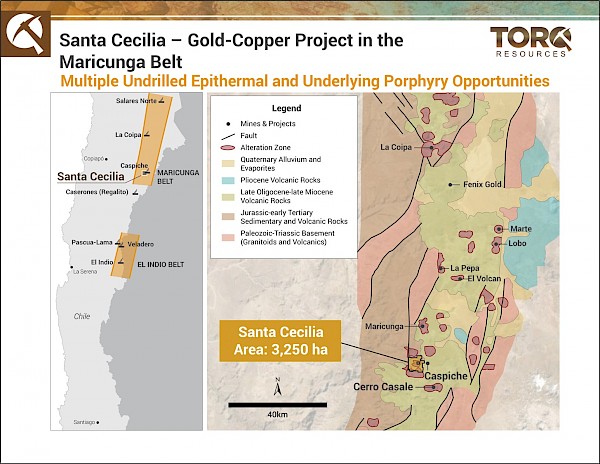
Figure 1: Illustrates the location of the Santa Cecilia project in the southern region of the world-class Maricunga belt, which includes world-class multi-million-ounce deposits such as Salares Norte, La Coipa, Cerro Maricunga, Marte, Lobo, La Pepa, El Volcan, Caspiche and Cerro Casale.
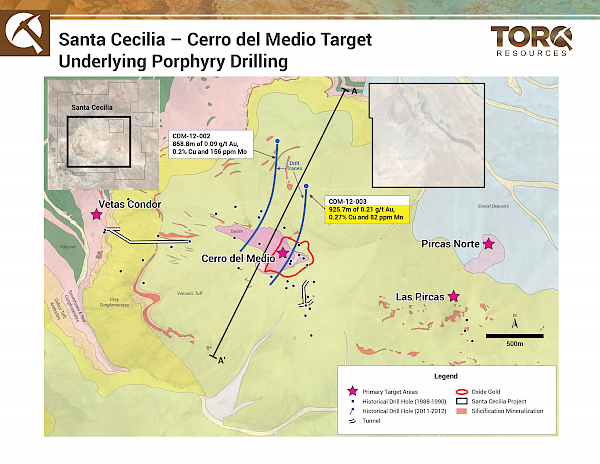
Figure 2: Illustrates the two-hole drill program conducted from January 2012 to May 2012 to test for porphyry mineralization beneath the shallow epithermal mineralization encountered in the previous operator’s drilling. The two holes were drilled from the northern side of the topographic high, defining the Cerro del Medio target area, and both intersected hundreds of metres of gold – copper – molybdenum porphyry-style mineralization.
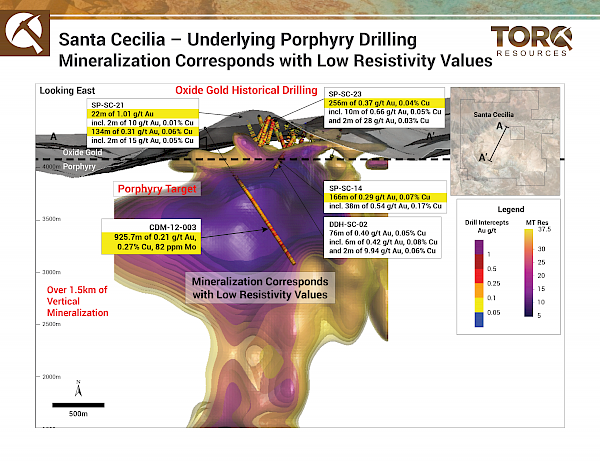
Figure 3: Illustrates one of the two drill holes conducted in 2012 to target porphyry mineralization beneath the epithermal mineralization encountered in the previous operator’s drilling. Importantly, gold-copper porphyry mineralization corresponds to an area of 2 km x 2 km x 1 km of low resistivity values defined in both induced polarization and magneto-telluric geophysical surveys with mineralization open at depth and laterally.
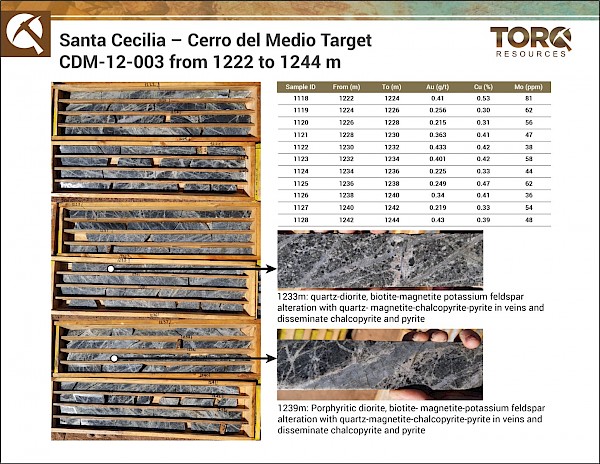
Figure 4: Illustrates multi-phase mineralized porphyries associated with strong stockwork veining and potassic alteration.
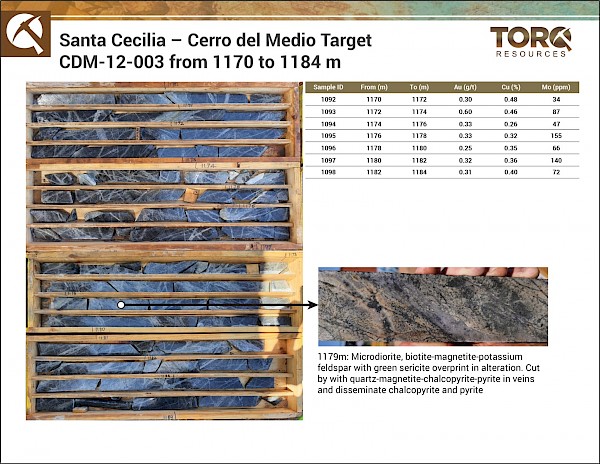
Figure 5: Illustrates multi-phase mineralized porphyries associated with strong stockwork veining and potassic alteration.
Michael Henrichsen (Chief Geologist), P.Geo is the Qualified Person who has reviewed and assumes responsibility for the technical contents of this press release.
ON BEHALF OF THE BOARD,
Shawn Wallace
Executive Chairman
For further information on Torq Resources, please contact Natasha Frakes, Vice President of Communications at (778) 729-0500 or [email protected].
About Torq Resources
Torq is a Vancouver-based copper and gold exploration company with a portfolio of premium holdings in Chile. The Company is establishing itself as a leader of new exploration in prominent mining belts, guided by responsible, respectful and sustainable practices. The Company was built by a management team with prior success in monetizing exploration assets and its specialized technical team is recognized for their extensive experience working with major mining companies, supported by robust safety standards and technical proficiency. The technical team includes Chile-based geologists with invaluable local expertise and a noteworthy track record for major discovery in the country. Torq is committed to operating at the highest standards of applicable environmental, social and governance practices in the pursuit of a landmark discovery. For more information, visit www.torqresources.com.
Notes on Historical Exploration Information
In the course of optioning the Santa Cecilia property, the Company’s geological staff was provided with a number of technical reports by past operators dating variously from 1985 to 2015. All drill results and material data sets have been included in this news release. These reports summarized and assessed certain geological, geochemical and geophysical work carried out by the past operators. Also included in the information package provided were reports on drilling in 1988, 1989, 1990, and 2012, including assays. None of the reports attempted to establish any resource on the property. The Company’s geological staff has now digitized much of the underlying data and is using the reformatted information to assess the conclusions of the earlier work and to plan future work. Drill core from the 2012 drill program is still available for re-assay. The prior work will be summarized and evaluated in an NI 43-101 compliant report. Until such summary and assessment are described in an NI 43-101 report, readers of this news release should appreciate that the posited geological modelling is based on information which, while compiled by reputable operators, has not yet been systematically verified and evaluated for accuracy and completeness.
2012 CDM Drilling
Historical drill samples were taken by sawing drill core into equal halves on site with one half being sent to Acme Analytical Laboratories in Copiapo, Chile for preparation and analysis. All samples were assayed using 30 g nominal weight fire assay with AAS finish (Acme method G6) for gold. Silver and base metals were analyzed as part of the multi-element aqua regia digest ICP-ES method (1D01). QA/QC programs for 2012 core samples using lab duplicates, standards and blanks indicate good accuracy and precision in a large majority of standards assayed.
Forward Looking Information
This release includes certain statements that may be deemed “forward-looking statements”. Forward-looking information is information that includes implied future performance and/or forecast information including information relating to, or associated with, exploration and or development of mineral properties. These statements or graphical information involve known and unknown risks, uncertainties and other factors which may cause actual results, performance or achievements of the Company to be materially different (either positively or negatively) from any future results, performance or achievements expressed or implied by such forward-looking statements.
Neither the TSX Venture Exchange nor its Regulation Services Provider (as that term is defined in the policies of the TSX Venture Exchange) accepts responsibility for the adequacy or accuracy of this release.

